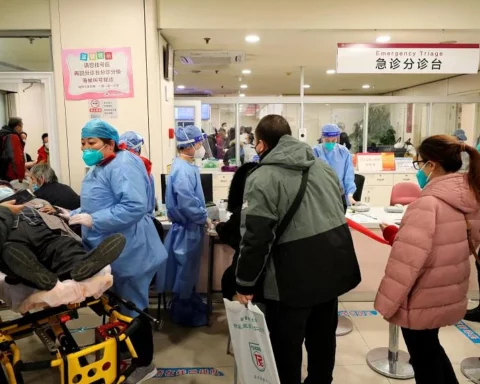A few months ago, my 84-year-old father fell in the middle of the night. We went immediately to the local emergency department. Despite taking anticoagulants for atrial fibrillation, I was much relieved that he did not have a brain bleed. Only requiring staples and stitches for his head and elbow lacerations, I thought we had dodged a bullet.
Thank you for reading this post, don't forget to subscribe!Like clockwork, 3 days later my mother called to tell me my father had COVID-19. Why, I kicked myself, had I not put a mask on him at 2 am when the paramedics arrived? Thankfully, my mother is a wonderful caregiver, but of course I now worried about her contracting COVID-19 as well.
We discussed the importance of them both wearing N95 masks and keeping him in isolation. We knew this would be difficult for him, particularly because he has some early signs of dementia and would likely be forgetful and frustrated by the enforced regimen.
As a good physician (and only daughter), my next priority was ensuring that my father was prescribed the oral antiviral, nirmatrelvir-ritonavir (Paxlovid). I had assumed this would be straightforward. Alas. My mother called the physician’s office, but their primary care physician had no openings, so we would have to see a covering physician via a video visit. My parents hadn’t ever used this remote platform and, like many other older adults, aren’t especially tech savvy. Although excruciatingly frustrating to remotely navigate my parents through the technological challenges, we finally got them on the platform in time for the appointment.
The physician told us that if he prescribed Paxlovid, we would have to reduce my father’s statin, but more concerning, that the antiviral was contraindicated with anticoagulants. We left the appointment with no definitive treatment plan and the physician promising to look into this and call back. About 20 minutes later, he called my mother to say that he would not prescribe Paxlovid because of the serious drug-drug interaction with anticoagulants. He advised that my father could either come to the hospital to get an intravenous monoclonal antibody treatment or take a different oral antiviral called molnupiravir. I hadn’t even heard of the latter. Later, I learned it was only about 30% effective at reducing hospitalization and death: substantially less than the reported efficacy of nirmatrelvir-ritonavir.1
About 30 minutes later, my mother got a call from their primary care physician’s assistant. Apparently, their primary care physician had heard about my father’s diagnosis and prescribed Paxlovid with multiple recommended changes to his other medications. Notably, their physician did not recommend adjusting the statin dose. As a psychiatrist, all of this is far outside my area of clinical expertise. I have never prescribed Paxlovid—all I knew was that I wanted my father to get it. Confusion reigned with one physician telling us that it was contraindicated, and another prescribing it, but with specific instructions that did not include the medication changes that the first physician had initially recommended.
So what did the good daughter and privileged physician do? She called a colleague who is a critical care physician. My colleague reassured me that plenty of patients have safely taken Paxlovid and anticoagulants with close monitoring. I sent the list of my father’s medications along with my interpretation of recommended medication adjustments from both physicians. My colleague reviewed all of this with a pharmacist who confirmed the proposed plan. I then wrote an extremely detailed email to my mother, with step-by-step instructions for how to implement the updated medication regimen.
After the initial Paxlovid saga was over, my mother developed symptoms and also tested positive for COVID-19 (of course). Once again, we fought our way through the online video barrier, meeting with another covering clinician, who unfortunately made inappropriate recommendations for my otherwise healthy 78-year-old mother. The clinician adamantly recommended that my mother not take Paxlovid—instead, prescribing azithromycin, steroids, and several over-the-counter medications. I’m a psychiatrist, but even I knew that treating a virus with antibiotics and allergy medications made no sense. In the split screen, I could see my mother frantically scribbling down the recommendations. Following the video visit, I immediately called my mother and said, “You are absolutely not doing what they recommend. Biden took Paxlovid. Fauci took Paxlovid. You are taking Paxlovid.” Fortunately, once again, the office assistant for their regular primary care physician called (after hearing about her COVID-19 diagnosis from the staff) with a prescription for Paxlovid.
Thinking that the second act of this drama was over, I got a frantic call from my mother at 4 pm later that day, a Friday. She had called the pharmacy and was told her prescription wasn’t there. Worried that we wouldn’t be able to sort this out before the physician’s office closed for the weekend, I spent a painful hour with the pharmacy and the physician’s office (both insisting that my mother join the call to release information) confirming and reconfirming that orders were made and that the prescription would be available, all the while stuck in traffic with my middle schoolers. At its conclusion, I explained to the children that they had just gotten a small taste of what my last couple of days had been like. (They were exceptionally nice to me the rest of the day.) In writing this piece, I also have to wonder whether my mother, an immigrant from Ecuador, would have been treated differently had she not had an obvious accent.
At the end of the day, both parents got the medication they needed and went on to recover without complications. They avoided hospitalization and death, unlike a few of our less fortunate family members and friends. Nevertheless, I couldn’t help thinking: “What happens to other people?” Because of my privilege as a physician, I have connections to outstanding colleagues and the ability to navigate the complex health care delivery system. Not to mention other evidence of privilege in terms of my financial means, the color of my skin, English fluency, and health literacy.
As I shared this story, I found that variations of my family’s COVID-19 story had been experienced by several colleagues. Their academic rank didn’t matter. From a clinic director to a vice dean to a vice chancellor, all had the same story: it was very hard to get their loved one Paxlovid.
As a health services researcher and administrator, I am drawn to seeking or developing solutions to problems, whether at the individual level or at the system level. Herein are some lessons learned to help family members or other older adults navigate COVID-19. First, at the individual level, I suggest having a plan for getting treatment before it is needed. Additionally, if your parents agree, get a “friends and family” document signed (with witnesses) and share this with every member of their health care team (physicians, pharmacies), so you can help with direct communication.
At the system level, there are 3 main suggestions. First, all primary care physicians should be provided with up-to-date guidelines on treating COVID-19 (ideally embedded within the electronic health record). There is no excuse for prescribing an ineffective medication nearly 3 years into a global pandemic. Second, as increasing numbers of people use home tests to diagnose COVID-19, the prescription processes for oral antivirals must be worked out by primary care clinics and communicated to patients in advance. Finally, I believe that health care systems should provide older patients, and others with limited computer literacy, with a contact number to call and get a human being on the phone to assist them with navigating the virtual health care system.
Getting Paxlovid prescribed for my parents shouldn’t have been this hard.
Corresponding Author: Christina Mangurian, MD, MAS, University of California, San Francisco, 675 18th St, Box 3130, San Francisco, CA 94143 (christina.mangurian@ucsf.edu).
Conflict of Interest Disclosures: Dr Mangurian is supported by grants from the National Institute of Mental Health, National Institute on Minority Health and Health Disparities, National Institute of Allergy and Infectious Diseases, and National Institute on Drug Abuse, Department of Defense, Health Resources and Services Administration, Doris Duke Charitable Foundation, California Health Care Foundation, Genentech, and United Health Group.
Additional Contributions: I thank my parents for allowing me to share their story. I also thank Amy Markowitz, JD, University of California, San Francisco, for editing assistance, for which she was compensated.








